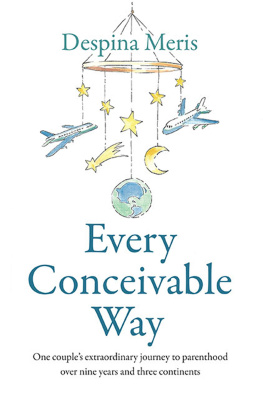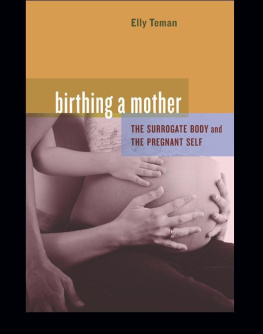Introduction
We women have long been struggling to maintain power over our capacity to give birth. In the trs longue dure since the defeat of matriarchy (if it had ever existed), more and more of us across the planet have regained this power, becoming able to choose if and when to have children. Reproductive rights are the legal expression of this regaining our procreative capacities. The goal of reproductive rights for all women was stated in the Convention for the Elimination of All Forms of Discrimination against Women (CEDAW) adopted in 1979, and in all subsequent and related international treaties under the aegis of the UN. Reproductive rights, put into national laws and then into effect by an increasing number of countries, include the right for women "to decide freely and responsibly on the number and spa c ing of their children and to have access to the information, education and means to enable them to exercise these rights. " In Beijing in 1995 it was made explicit that: " Acts of violence against women also include forced ste r ilization and forced abortion, coercive/forced use of contraceptives, female infanticide and prenatal sex selection " (Platform of Action for the Beijing Declaration) .
How will women who have regained power over the birthing process decide to use it? If a woman uses it to have a child in order to help the infe r tile, will it mean that she has enslaved herself again with her own hands? Is it different whether she takes money for this act or not? What about the rei m bursement of her expenses, what about her foregone gains? Should she be able to decide by herself on the destiny of a child born to her even if it was conceived by agreement? When should she decide his or her family destin a tion? Moreover: what is the role of the concrete conditions of inequality in the present world-economy for the use that women make of their reprodu c tive capacities? Generalizations are difficult: my point of view is from a core country, where women who cannot themselves bear children (or men) can utilize their other powers to ask a woman to bear a child for them and not from a peripher y or semiperipher y country where women are often asked to work in this way (countries of the " core " are richer as a result of their un e qual exchange with the world ' s peripheries, in world-systems analysis term i nology see the works of Immanuel Wallerstein, Terence Hopkins, Gi o vanni Arrighi and their social science school ) .
I am writing this book to make a contribution to the debate, striving to preserve and enhance women ' s rights over our natural reproductive powers, wi t h in the context of all the new possibilities that reproductive technologies have brought about since the first successful birth of a baby conceived in vitro in 1978 (she was called Luise Brown) . But t echnology is not involved in the minimal definition of the practice of surrogacy, which is basically the surrendering of a child after its birth to those who arranged for the pregna n cy of the willing woman to take place. Or maybe, as in the Bible, who i m posed the pregnancy on a slave. In fact, many authors point out that the rather unfortunate beginnings of surrogacy go as far back as the Old Te s tament. The Book of Genesis tells that Sara i , at 75, was too old t o give the slightly younger Abra m the progeny that would constitute Yahweh ' s people of the covenent . She suggested that Abram should make Hagar pregnant, and then she would raise the child as he r own. Hagar was a slave in Abr a m ' s house, therefore not really entitled to express her opinion about the proc e dure. She gave a son to Ab r a m, and Sara i became Ishmael ' s social mother, but only until she herself became pregnant and gave birth to their true heir Isaac. At that point, not only Abraham and Sarah got h ' s in their names, but both Hagar and Ishmael were thrown out of the house and sent into the wilderness , since her contribution to the construction of the new nation was no longer needed. In another passage from the Book of Genesis we can also find references to the direct purchase of children: " Every male among you who is eight days old must be circumcised, including those born in your household or bought with money from a foreigner, " are Yahweh ' s reported words. Another biblical story of surrogacy involves two female slaves, Bilha h and Silpa h , belonging to the sisters Ra c hel and Lea h , with a partially unhappy ending: the second sister did not recognize the two sons that Silpa h bore for her (Genesis 30).
In patrilinear societies, as legitimacy is conferred upon the child by the father, a male heir is strongly desired. Children were easily circulated from fertile to infertile couples in the extended family or beyond it. Now we have progress to help in procuring heirs with medical interventions, and infertility has become surmountable for many. Not having one ' s own children has b e come the difficult decision of when to stop medical interventions however uncertain, costly, and painful they are.
Fostered by IVF technology (in vitro fertilization), surrogate agre e ments have seen a fast growth, similar to what happened when single hete r osexual and lesbian women started having children en masse making recourse to assisted insemination with frozen sperm. There has always been the po s sibility to procreate with casual sex with a man, or with self-insemination, the low-tech, DIY option of inserting sperm in to the vagina without sexual relations or medical intervention (a turkey baster does it). But only a minor i ty conceives in these ways. Instead of community organizing to find donors and to secure anonymity (if wished for), and instead of going through the inconvenience of having casual sex with an untested stranger, paying doctors looks simpler and is therefore preferred as it is by heterosexual couples, who could also practice self-insemination. We are used to delegat ing respo n sibility for our acts to " experts. " But the reverse side is the application of more and more technology to the pregnancy and birthing process. As C a terina Botti conveys it: the main character at birth is not the woman beco m ing a mother, but the medical personnel or rather the gynaecologist (Botti 2007) . And in surrogate motherhood the main character it ' s not the pregnant woman at all, but the phantom of a child coming from nowhere, concretely manufactured by a clinic or by the services of an intermediating agency.
Women themselves perceive their bodies as fragile and inapt. On the contrary, no less than 80% of women (an estimate made by the gyneco l ogists of IRIS, an Italian association promoting the rights to health and well-being) are able to give birth without complications not really by the m selves, but with the assistance of a midwife and of the pregnant woman ' s " birth team " of her choice. But it is doubtful that women would choose it, as it contrasts gravity and makes the descent of the fetus through the birth canal much more difficult than any other position except being hung upside down.
Are the technological novelties enhancing women ' s freedom, solving the infertility problems of those who do not possess procreative natural power, or are they just a deceptive device to deprive women of what used to be a unique experience and a unique tie between mother and child? We stand at a crossroad.
The preamble of the Convention for the Elimination of All Forms of Discrimination against Women stresses "that a change in the traditional role of men as well as the role of women in society and in the family is needed to achieve full equality of men and women. " New reproductive techniques, in particular IVF plus implant of the fecundated egg, certainly amount to an abrupt change in traditional gender roles: the fragmentation of the " mother " is the most commented upon of its features. Since 1978 we must distinguish between egg, pregnancy, and social motherhood on one hand, and on the other (as also in former times) between sperm and social fatherhood. The Convention on the Rights of the Child (1989) recognizes the child ' s right to grow up with her or his family, and also the European Convention for H u man Rights has codified a right to the respect of one ' s " family life, " but the new technologies have confused the scene, and many now have doubts about what the family of a child conceived in vitro with a donor egg really is. Among genes, intentions and pregnancy, what and who decides?








